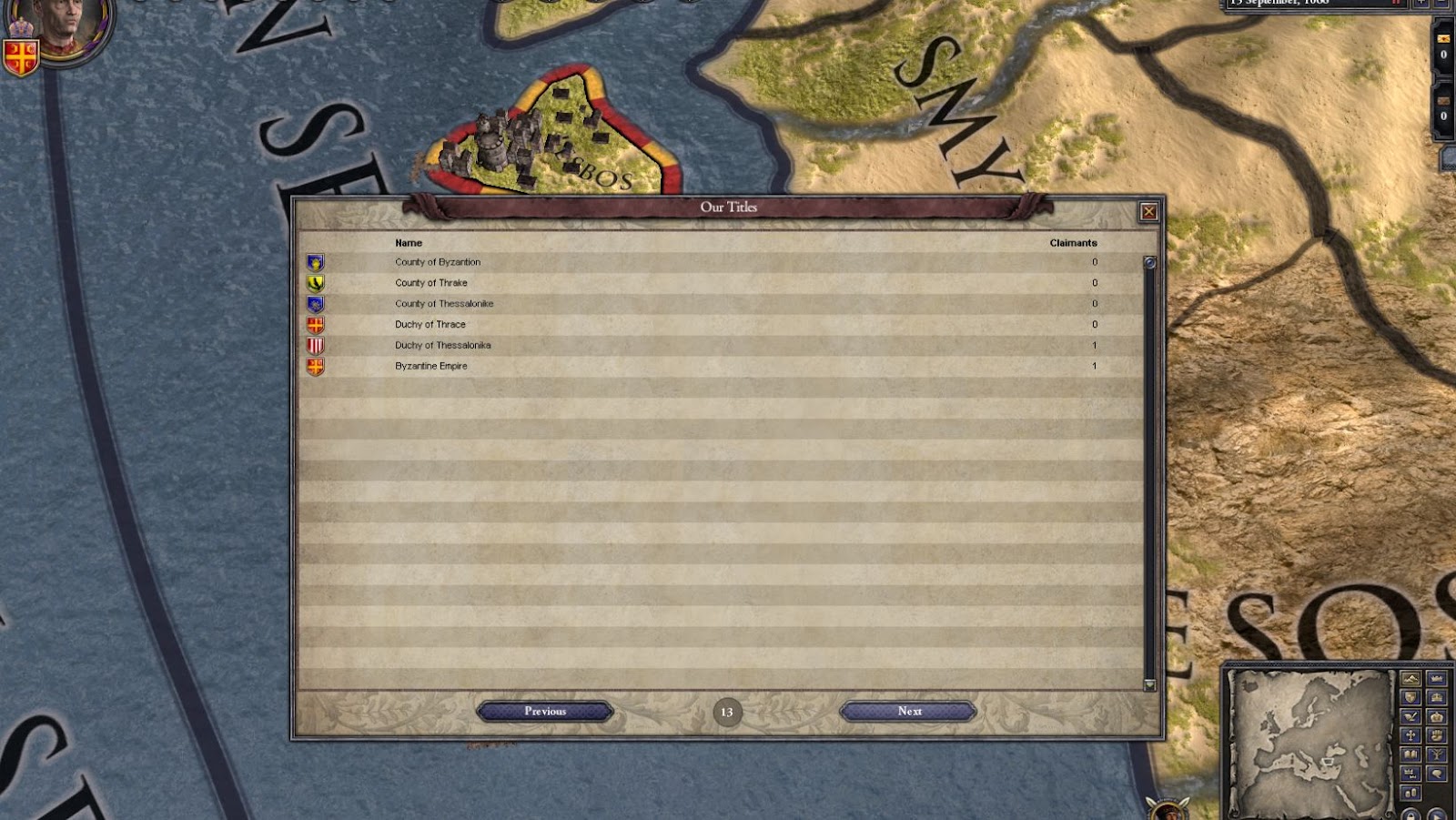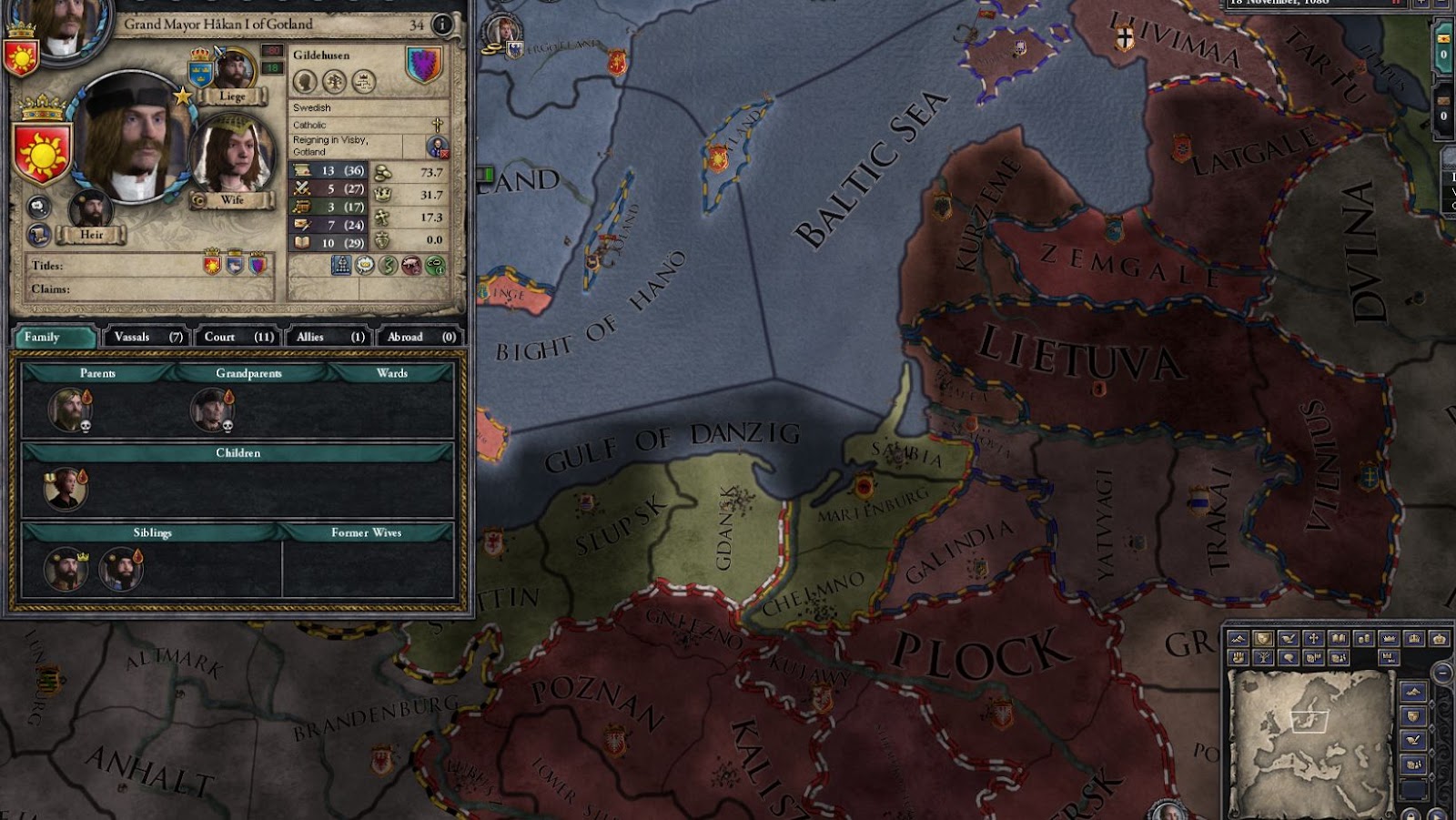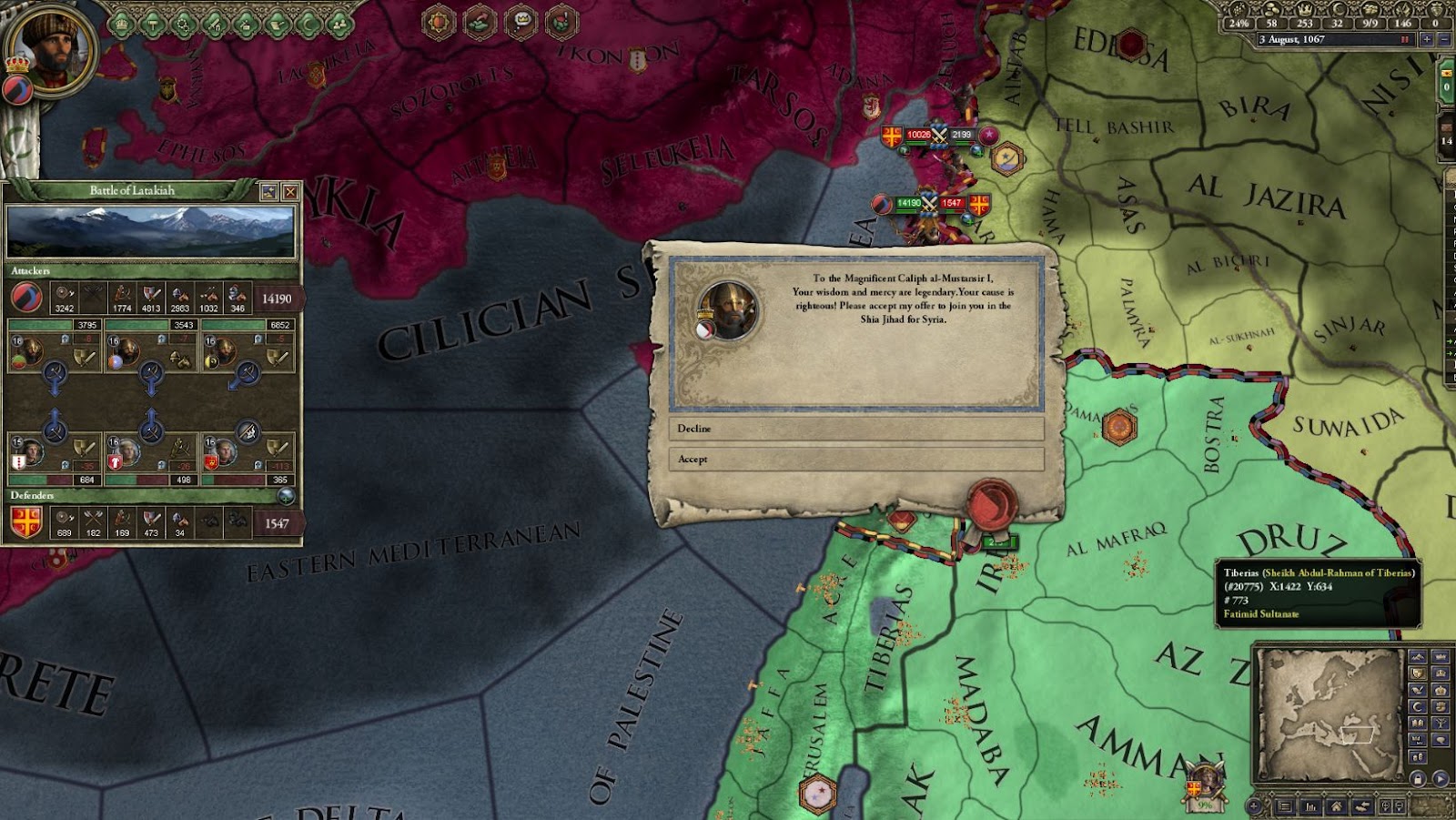
To understand the various factors that affect inheritance in Crusader Kings 2, you’ll need to know about patrilineal inheritance, agnatic-cognatic inheritance, gavelkind inheritance, primogeniture inheritance, ultimogeniture inheritance, tanistry inheritance, feudal elective inheritance, seniority inheritance, open succession inheritance, and 1.10 Variant Inheritance Laws. Each factor affects who will inherit titles and land differently, so it’s important to understand how these inheritance laws work to plan and strategize in the game.
Patrilineal Inheritance
Patrilineal inheritance passes titles, lands, and wealth from father to son. In Crusader Kings 2, this is the default. The eldest son has priority. Below is a breakdown of different types of patrilineal inheritances with in-game examples:
Types of Patrilineal InheritancesExamples
Agnatic Primogeniture Kingdoms of France, Spain
Agnatic-Cognatic Primogeniture Holy Roman Empire
Gavelkind Scandinavian countries
It’s important to plan your character’s succession before dying. Law changes, compatible castes/governments, and religious practices can change the type of succession.
Pro Tip: Without a male heir or male relative, you may lose it all upon death. Consider marrying women who have strong traits that will pass on to children. Or try to acquire suitable males through betrothal or inviting courtiers.
Gender equality? Nah – just manipulate inheritance laws in Crusader Kings 2!
Agnatic-Cognatic Inheritance
Take a look at the table below:
CharacterHeir
King A Son 1
Queen B Daughter 1
Prince C Grandson 1
If King A has multiple sons, all his lands will be split. However, if Queen B or Prince C have no male heir, all their possessions are passed to their female offspring.
Agnatic-cognatic inheritance may have historical importance and follows traditional values. But, it may not match with modern beliefs.
In one Crusader Kings 2 game, my character was a queen without any suitable male heir. I decided to pass the empire to a female relative to stop my dynasty ending after me. This upset my vassals and resulted in a rebellion that overthrew my rightful heir. Regarding Gavelkind Inheritance in Crusader Kings 2, it’s better to forget ‘sharing is caring’ and accept ‘sharing is tearing apart your realm’.
Gavelkind Inheritance
In Crusader Kings 2, Gavelkind Inheritance is a popular succession method. When rulers die, their male children divide the kingdom’s shares equally. This can lead to conflict and competition between sons, even with different mothers.
Players can change their succession laws to Primogeniture or Ultimogeniture to avoid such division of land. That way, they can make sure the desired heir gets all possessions upon death. Pay close attention! It’s important for a smooth game.
Who needs a will when you have primogeniture? It’s like ‘Survivor’ but with a kingdom as the ultimate prize – no votes necessary!
Primogeniture Inheritance
Firstborn Child Inheritance, or ‘Primogeniture Inheritance’, has been a major inheritance in Crusader Kings 2. Let’s look at the factors that impact this rule. Gender affects inheritance – male-preference primogeniture leaves females out, but gavelkind is equal. Absolute Cognatic means females can inherit alongside their male siblings. Kinsman claims trump normal inheritance, and Military Orders have their own rules.
Players can pick different forms of inheritance. For example, Primogenitor was the first ancestor to get the land, and ultimogeniture is a lazy option where you wait for your younger sibling to inherit.
Ultimogeniture Inheritance
Ultimogeniture Inheritance is a different type of succession than what we usually expect. It’s about the youngest child inheriting – not the oldest.
Let’s look at the table to understand the differences:
Ultimogeniture Youngest eligible heir inherits
Primogeniture Oldest eligible heir inherits
Gavelkind All eligible heirs receive a portion of inheritance
It’s unusual, but it can create interesting situations. For example, you might have a young heir in line for the throne that you must prevent. You may even need to kill their older siblings to ensure the one you want becomes the heir.
It could be better, but in Crusader Kings II, anything goes. Who needs nepotism when you can choose your next heir like it’s a game of musical chairs – this is tanistry!
Tanistry Inheritance
Tanistry Inheritance is a form of elective monarchy in Crusader Kings 2. It allows family members to choose the next ruler.
The table below shows the vote weight for each eligible candidate:
Eligible CandidatesVote Weight
Current Ruler 100
Adult Male Kinsmen 50
Adult Female Kinsmen 10
Only Celtic cultures and certain religions can use Tanistry Inheritance. It also needs the right tech level and laws. A tip for using Tanistry Inheritance is to ensure eligible candidates are pleasing their vassals. This increases their vote weight and helps your dynasty keep control.
You should also limit marriages outside your dynasty. This stops potential heirs outside your family from getting too much support from the vassals, and helps secure dynastic stability.
Feudal Elective Inheritance
For Crusader Kings 2, a type of dynastic succession called ‘Feudal Elective’ is used. Vassals can nominate their preferred heir to the liege lord’s throne. The one with more votes is appointed as the new ruler.
The table below shows factors for Feudal Elective Inheritance:
FactorDescription
Voter Influence Authority of a voter compared to others.
Ruler Charisma How well-liked the current ruler is.
Diplomacy Skills How skilled in persuasion.
IC Character Relationships Relations between characters affect voter preferences.
It should be noted that family members who are not direct heirs can become rulers. To maintain a dynasty, good relations with allies and family is key. Strategic marriages add alliances that help electoral outcomes. Also, keeping an eye on potential candidates strengthens power.
Feudal Elective regimes have an example in England’s 1066 Edward the Confessor reign. He had no children, so Harold Godwinson took over with opposition from William Duke of Normandy and Harald Hardrada King of Norway.
In Seniority Inheritance of Crusader Kings 2, age matters when your heir is 90 and you’re praying for death!
Seniority Inheritance
Seniority Inheritance is a method of succession in which the monarch with the oldest living relative inherits the throne. This can lead to a more stable rule but may not always result in the best candidate. To ensure a stronger ruler, one can enact certain laws or traditions. These may include encouraging older family members to take on advisory roles, or setting age limits for possible heirs. Thus, the ruling monarch can benefit from experience and wisdom while avoiding a weak ruler. Another option is Open Succession in CK2, which allows family members to fight over the throne and plot each other’s demise.
Open Succession Inheritance
Open Succession Inheritance determines the next ruler based on family member prestige. When rulers have multiple children, their prestige decreases and conflicts between siblings rise. Rebellious heirs may challenge for the throne if they believe they have a claim. To smooth out succession in Open Succession Inheritance, it’s important to recognize the heir with highest prestige and give them lands or titles. Players should keep discontented heirs content through diplomatic actions such as marriages and appointments.
Why follow the usual inheritance laws when you can play a game of Thrones with your family tree in Crusader Kings 2?
Variant Inheritance Laws
In Crusader Kings 2, different laws control the transfer of titles and property from generation to generation. These rules differ based on culture, religion, or geography. Here’s a table of some of them and their features:
Law Features
Gavelkind Divide property among eligible children.
Tanistry Successor elected from eligibles by nobles.
Cognatic Primogeniture First-born child inherits, regardless of gender.
Ultimogeniture Youngest child inherits everything.
Agnatic-Cognatic Primogeniture First-born son inherits. If not, daughter(s) share it.
It’s essential to understand the law of your dynasty, as it can have a huge effect on gameplay. For example, it can affect which heir gets preferential treatment, who marries in or out, and even when arranged deaths may occur. For instance, Matilda’s claim to the English throne after her father, King Henry I, sparked a civil war called The Anarchy.
Knowing inheritance laws and how they apply to your game can make the difference between keeping and losing power in Crusader Kings 2. For example, age before beauty only matters if you’re an heir and the beauty is your sister!

Crusader Kings 2 How To Get Primogeniture
To understand how gender and age impact inheritance in Crusader Kings 2, explore the sub-sections of gender-based and age-based inheritance. Then, consider the role of children and spouse in inheritance and the impact of traits.
Gender-Based Inheritance
Inheritance of traits and characteristics is affected by many factors, including gender. For example, males and females can inherit different traits because of the presence or absence of certain genes on the sex chromosomes.
To understand this better, here’s a table showing gender-based inheritance examples. For example, we can see that certain genetic disorders such as hemophilia and color blindness are inherited from the mother to her sons. On the other hand, muscular dystrophy and fragile X syndrome can be passed down from the mother to both sons and daughters.
Genetic ConditionInheritance Pattern
Hemophilia Mother -> Son(s)
Color Blindness Mother -> Son(s)
Muscular Dystrophy Mother -> All Children
Fragile X Syndrom Mother -> All Children
It’s important to remember that these inheritance patterns can occur in either gender. Also, understanding gender-based inheritance can be useful in predicting the risk for certain genetic conditions. For instance, even if a woman doesn’t have the gene herself, she may still pass it down to her sons if she has a family history of hemophilia. Knowing this can help people make informed decisions about their reproductive plans.
Pro Tip: If you’re worried about your genetic risk, it’s best to talk to a genetic counselor for helpful advice and guidance.
Age proves that inheritance isn’t always a case of ‘like father, like son’ – sometimes it’s more like ‘like a grandfather, like great-grandson’.
Age-Based Inheritance
Age can seriously affect inheritance distribution. The table below gives an overview:
Age RangeInheritance Received
<20 Minimal
20-40 Moderate
40-60 Substantial
>60 Significant
This should be taken as a guide only. Factors like family relations, legal documents and wealth can also come into play.
Gender is another factor to consider. Finally, bias and societal norms can influence inheritance distribution. Research by the Federal Reserve Board shows inheritances have little effect on US wealth inequality. Kids may expect their parents’ inheritance but genetics only accounts for half of it.
Role of Children in Inheritance
Inheritance involves many things – gender, age, and family ties. Kids play a key part in the process – based on laws and customs. Cultural norms, religious beliefs, and legal statutes all influence inheritance practices. Shares of inheritance can be equal or unequal. This depends on birth order, gender, competency, marital status, and financial need. In some cultures, male children are preferred. In others, female children inherit as much as males. Laws can even vary between siblings, depending on their date of birth.
It’s important to understand these variations. They can affect family dynamics and relationships. Families should talk openly about inheritance expectations, to prevent conflicts. Deciding how to divide property can also keep familial ties strong.

Role of Spouse in Inheritance
Inheritance is complex. Gender and age influence it. When it comes to spouses, several factors are taken into account. Legal rights to the assets of their deceased partner differ from region to region. A spouse may inherit all the estate. Or, they may receive a portion while other relatives get an equal share. Debt and marital agreements can also affect inheritance.
Pew Research Center’s 2020 research shows that women outlive their husbands more than men outlive their wives. This means that women have a greater influence on inheritance.
It looks like genetics determine our fate – whether it’s inheriting eye color or a weird sense of humor!
Impact of Traits on Inheritance
Traits such as gender and age can have a big impact on inheritance. To understand this, a table is created with three columns: traits, probability of inheritance and examples. For example, a male child has more chance to inherit male-pattern baldness from their father than a female. Also, age-related diseases like Alzheimer’s will likely be passed down from ancestors who had it.
Other factors that can affect inheritance include medical conditions and lifestyle choices. For example, an individual’s health might increase or decrease the chance of inheriting certain diseases. Smoking or drinking can also influence how genes express themselves and alter inheritance patterns.
Gregor Mendel conducted experiments on pea plants in the late 19th century. His findings were the basis of modern genetics. He discovered that traits are passed down through generations due to inheritance laws. These findings helped us understand genetic transmission and inspired more research.
Even in Crusader Kings 2, some events are outside inheritance laws – like a ruler’s sanity!











